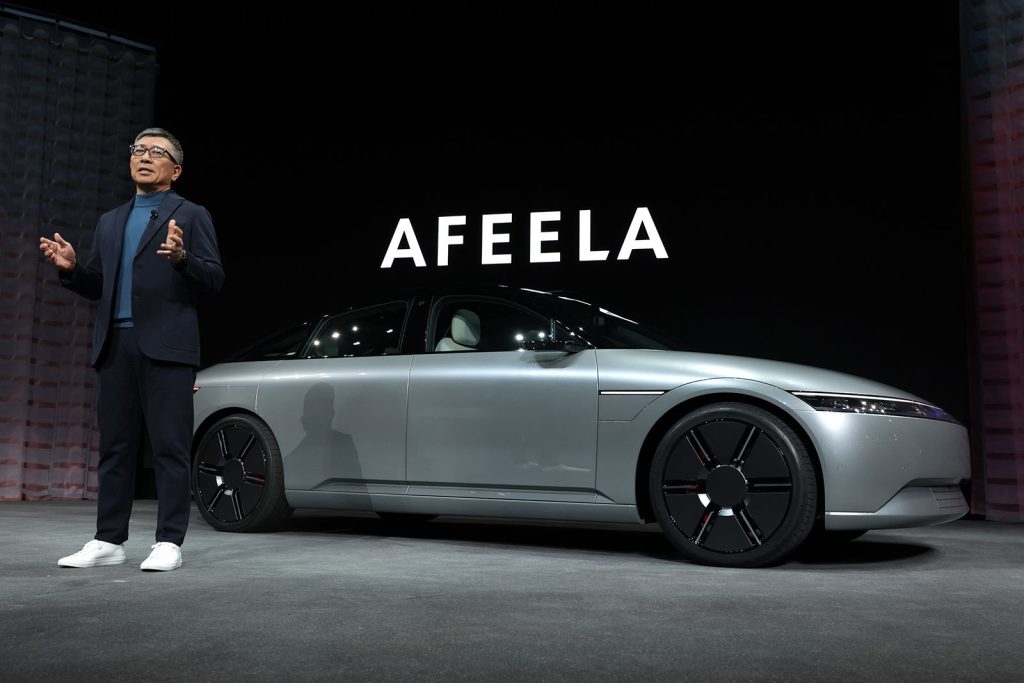Tech giant Sony and automaker Honda’s joint mobility venture unveiled a new electric vehicle (EV) prototype ‘Afeela’ at the Consumer Electronics Show (CES) 2023 in Las Vegas saying it would harness its vast entertainment content as it looks to become a player in next-generation cars. The new car will be sold first in the US in 2026 and pre-orders are said to open in 2025, reports The Verge.
Sony gave a glimpse of the Afeela, which sports rounded corners and a sleek black roof, at the CES 2023 technology trade show in Las Vegas. The car will use technology from hardware maker Qualcomm Inc (QCOM.O), including its “Snapdragon” digital chassis.
According to Sony Honda Mobility CEO Yasuhide Mizuno, the car would leverage Sony’s experience with artificial intelligence (AI), entertainment, virtual reality (VR), and augmented reality (AR) to present a unique EV.
“Afeela represents our concept of an interactive relationship where people feel the sensation of interactive mobility and where mobility can detect and understand people and society by utilizing sensing and AI technologies,” Mizuno said in a statement.
Over 40 sensors, including cameras, radar, ultrasonic, and lidar, will be embedded all over the exterior of the vehicle to improve its ability to detect objects and drive autonomously. Mizuno also said that Afeela will attempt to embody three main themes autonomy, augmentation, and affinity.
Sales in the lucrative US market will get underway in 2026, the companies say. Afeela’s chairman and CEO are former Honda China executive Yasuhide Mizuno (pictured). Sony and Honda first announced their intention to develop cars in June 2022, while Sony has previously revealed two EV concepts: the Vision-S sedan and Vision-S 02 crossover.
The former will manifest first, but the latter is a sure bet. Parallels between the Tesla Model 3 and Model Y are hard to overlook. The iconic Japanese companies say Afeela is about “pursuing innovation with diverse knowledge”, pairing Sony’s software know-how with Honda’s experience in car production. “We plan on exploring the possibility of how media can create a fun and exciting mobility interaction,” said Yoshida.
According to Afeela, the 2025 sedan model will be 4895mm long, about the same nose to tail as an Ioniq 6, and bisecting a Tesla Model 3 and Model S. It will seat five and come with dual-motor all-wheel drive (AWD), although we’ve no idea what battery and motor figures are yet.
“In addition to movies, games, and music, we envision a new in-cabin experience using our expertise in UX and UI technologies,” said Yoshida. Kim Libreri, chief technology officer of Epic Games, said that the most natural way to visualize important data within the car is through intuitive interactive photo real augmentation, which is what Unreal Engine does best.
Its design will be more rounded and minimalist than the first concept indicated, with black pillars making the glass roof appear to ‘float’, wheels designed for maximum smoothness through the air, and no visible door handles. The prototype’s exterior includes what the JV is calling a “Media Bar,” designed to use lights to communicate with people around it.
Inside it’s sparse, open, and breezy, with extensive use of more environmentally friendly materials planned. The steering yoke is like those in the Tesla Model S and Lexus RZ, while there’s a set of screens running pillar to pillar including camera feeds in place of side mirrors like a Genisis GV60, and augmented-reality navigation.
Naturally, there will be 5G-based OTA compatibility. Afeela says it aims to create the world’s best Level 3 automated driving suite by combining Sony’s sensors and Honda’s ADAS safety systems. The prototype is equipped with 45 cameras and sensors inside and outside, together with 800 TOPS of maximum computing power for the ECU.
It will be software-defined, using Qualcomm Technologies’ Snapdragon Digital Chassis SoC, while the JV also plans to tap value-adds with Epic Games’ Unreal Engine.“By fusing the real and virtual worlds, the mobile space will be expanded into an entertainment space and a moving space. Pursuing the possibility of new entertainment by making full use of digital such as Metaverse,” is how Afeela describes it.
Although the company will be headquartered in Tokyo, its first vehicle will be produced in the United States and exported around the world, including back to Japan. The prototype unveiled on stage was a sedan with a light bar across the front and a high-gloss black roof. Moreover, Sony said it expects its software to provide subscription services, so vehicle owners will likely have to pay a monthly fee to access certain features.
“In the future, the automobile will become a next-generation destination for social connectivity. Not only for the occupants but also for their network of friends and colleagues. It will become a continuum of our digital lives,” said Libreri onstage at CES.
To handle all the computing needed for automated driving and advanced driver assistance system capabilities, car telematics, and what we expect to be tricked infotainment system, Afeela cars will be built around Qualcomm’s system on a-chip technology, including their Snapdragon digital chassis.

